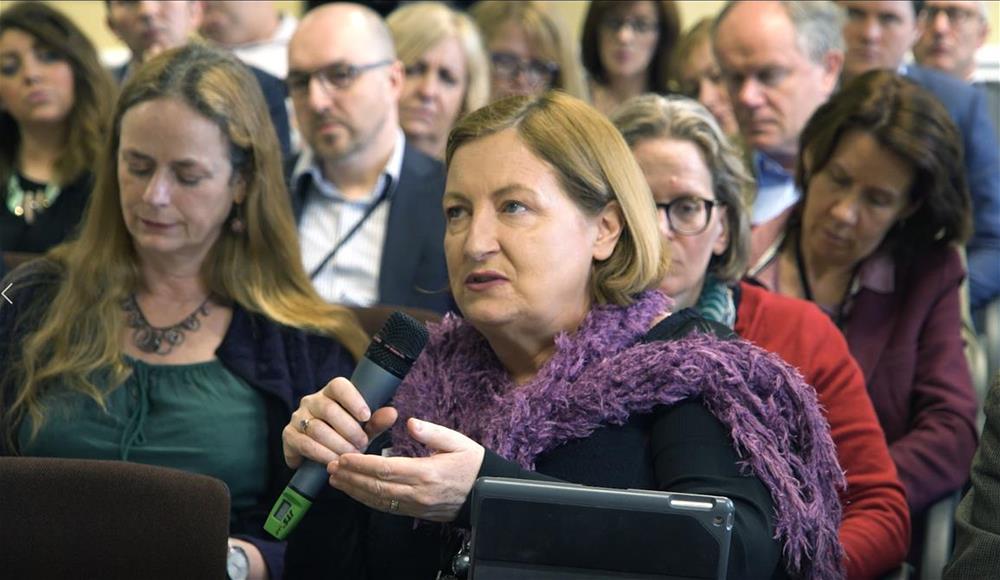Research and policy update

What makes a good regulator? Participants at our recent academic and research conference discussed the theme over a day and half. Find out how conference attendees from the GMC and GOsC answered this question.
What is it to be a good regulator?
A simple enough question to ask but slightly more complicated to answer. This was the question posed by our academic collaborator for the conference this year – Professor Deborah Bowman, Professor of Bioethics, Clinical Ethics and Medical Law, St George’s, University of London. Why did Professor Bowman choose this topic for the conference? Find out in this short video.
This was our sixth academic and research conference and was held at the beginning of March (7-8 March). Once again, we brought together academics, policy makers, researchers, regulators, accredited registers, clinicians, consultants and lawyers among others to discuss what makes a good regulator and share findings from their latest research projects. Attendees came from all four UK countries, as well as Australia, Belgium, Canada, Ireland and the Netherlands. The event continues to be popular with 110 people attending. There were 45 presentations on research on different aspects of the theme. The conference presentations are available on our website or you can watch the highlights.
How can research help improve regulation? Find out what our Chief Executive, Alan Clamp says in response to this question.
What role do patients have in ensuring safe care?
|
'I think you’ve got to share responsibility these days. I think we know a lot more than we ever did before. Now, you want to be more involved.' (Patient with a long-term condition)
|
'I’m trying to think whether the NHS would be more responsible for our safety than the doctor. No, I’d say 25% NHS, 25% patient and 50% doctor. The doctor makes the final decision.' (Carer for a vulnerable user of health and social care services)
|
We wanted to find out what patients (and service users) think about this. We have touched upon this issue previously – that patients can be effective partners in maintaining their safety. In Right-touch regulation and then examined it in more detail in the harm prevention chapter of Right-touch reform, we identified a number of agents contributing to the safety and quality of patient care; these include – among others – the various regulators and employers, as well as patients themselves. Whilst not proposing putting the responsibility for staying safe onto patients, the Authority suggests that patients can be effective partners in maintaining their safety.
At the beginning of the year, we contracted an independent research agency, Research Works, to explore further the role of patients and service users in ensuring the safety of the care they receive. The research was qualitative, based on a mixture of focus groups plus face-to-face and telephone interviews. These were carried out across the four countries of the UK, in both rural and urban locations; the research included patients from a range of backgrounds and with varying experiences of health and care services.
Some of the key findings from this sample of 86 participants were:
- Of all those involved in patient safety, health professionals were perceived as having most responsibility; recognition of the importance of taking responsibility for one’s own safety varied across the sample.
- In many ways, the research suggests that less experienced patients may be vulnerable to potential lapses in safety because they lack the experience of engaging with health services and the attitude and skills more experienced patients have developed.
- Caring roles helped individuals overcome any reticence they might feel about challenging health and care practitioners.
- Whilst patients are willing to question the care they are receiving, they also do not want to feel that their trust in health professionals is being undermined.
The report – which includes a rich selection of quotes to illustrate the findings – is now available on our website.
Recent conferences and seminars
What constitutes protection of the public in appeal hearings in health regulation?

We held this seminar in Edinburgh on 13 May bringing together legal professionals from England and Scotland to discuss ‘what constitutes protection of the public in appeal hearings in health regulation’. The event was also attended by senior staff from UK and Scottish regulatory organisations, government officials and academics. The event was chaired and facilitated by Rt Hon Lord Malcolm and Rt Hon Lord Glennie, and Rt Hon Lord Drummond Young also attended. Initial feedback suggests that attendees found the presentations and discussions informative and useful. There were presentations throughout the seminar, including on:
- sexual misconduct: understanding the moral mindsets of perpetrators;
- sexual motivation cases – perspectives from Scotland, England and Wales; and
- embedding the professional duty of candour.
There were also group discussions asking:
- How far should subsequent insight and remediation impact on sanction where there may be public interest aspects to the case?
- How do we assess (and who assesses) what is appropriate to maintain public confidence?
- How do we ensure consistency of outcomes in fitness to practise proceedings?
- What non-clinical conduct should engage fitness to practise issues?
Duty of candour in Northern Ireland
We have spoken at three events in Belfast recently about findings from our research on duty of candour. Colleagues in Northern Ireland are currently considering how best to implement recommendations from the Hyponatraemia Inquiry to introduce a statutory duty of candour on organisations – and individuals.
You can find all our work on the professional duty of candour here.
International work
Review of the Saskatchewan Registered Nurses Association published
Towards the end of last year, the SRNA commissioned us to review its complaints, investigations and discipline function. This report is the result of our work, including spending time at the Association to observe Council meetings. We used our own fitness to practise Standards of Good Regulation to conduct the review. We concluded that the SRNA had met four of the 10 Standards. Our feedback to help the SRNA improve its performance included 33 recommendations. However, we did not consider there was evidence to suggest risks to patient safety or public protection.
You can find out more about the review, as well as the full report.
Review of the College of Dental Surgeons of British Columbia
In March 2018, British Columbia’s Minister of Health Adrian Dix announced the appointment of Harry Cayton, when he was still in post as our Chief Executive to conduct a review into the College of Dental Surgeons of British Columbia’s (CDSBC) Board governance as well as the administrative and operational practices of CDSBC. The full report is available to read.
You can find all our international reports on our website.
Consultation responses
We have recently responded to consultations from:
Find more of our responses to regulators’ consultations on our website.